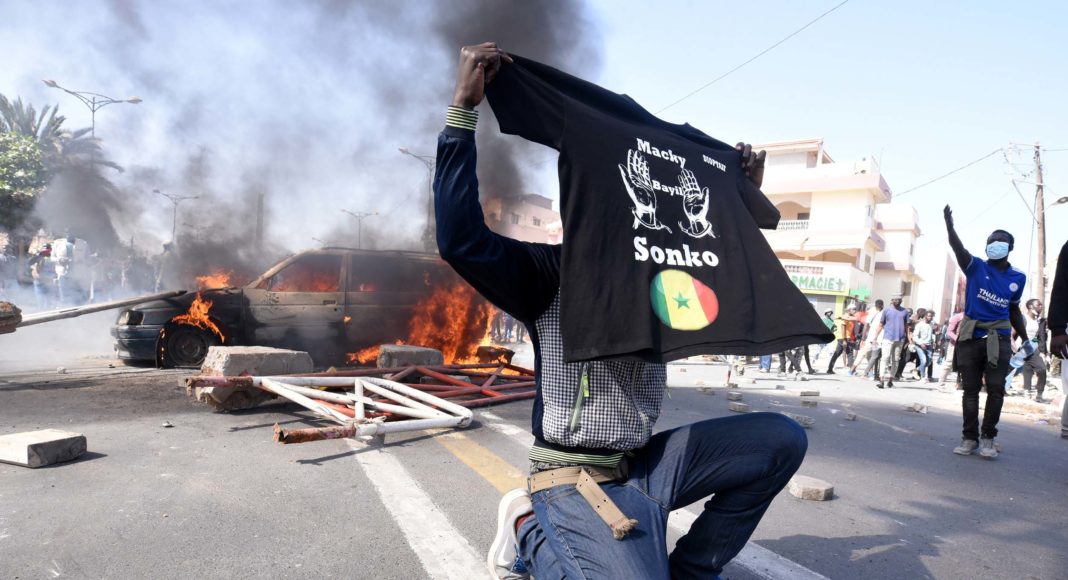By Aïda Dramé
What country is this when at night, the law of the strongest strikes? These mythical lyrics of Michel Berger keep repeating in my mind when I think about the recent events in Senegal. Between arbitrary arrests of protesters, police violence and murder, censorship of TV and radio stations, not to mention the misery in which a significant part of the population lives on a daily basis, the evil is deep.
But of all the ills facing Senegal, one has been obscured during the protests: rape culture. Rape culture manifests itself in the the normalizing and excusing of rape, use of misogynistic language, the objectification of women’s bodies and the glorification of sexual violence, creating a society where women do not feel safe.
The trigger for the recent riots in Senegal was the arrest of the main opposition leader and president of the PASTEF party, Ousmane Sonko, for “disturbing the peace” while on his way to court in a rape case against a young woman named Adji Sarr.
Not much is known about her, except that she is an orphan living in precarious conditions and that, according to some witnesses, she is “promiscuous”, “provocative”, “frivolous”, “manipulative”, to name but a few degrading descriptions. Since the beginning of this case, many people haven’t considered her a person in her own right. In the minds of some, Adji is “a nobody,” or at best “a political tool” whose body has just been used for cynical ploys by scheming politicians.
But very few believe her account of the night at the Sweet Beauté massage parlor where she said Ousmane Sonko raped her. This disbelief comes despite the fact that Adji herself stated she would retract her court case if Ousmane Sonko swore on the Quran that nothing happened between the two that night.

The idea is not to pronounce on the presumed or proven guilt of Ousmane Sonko. As Adji Sarr’s brother recently stated in an interview with leral.net: “It is up to the justice system to shed light on this case. But one cannot help but wonder why the fervor with which we defend Ousmane Sonko is not the same as that which is deployed to think that Adji Sarr could have told the truth?”
We can guess the answer: it is because she is a woman. As a woman, few give her the benefit of the doubt when she says she was raped. As a woman, public opinion de facto invalidates her story. In short, as a woman, not only is her word worthless, but she is also called every inelegant name imaginable.
Let’s take for example her recent interview. While she was re-explaining to the journalist the course of events, thus maintaining her accusations of rape, social media was full of despicable reactions. Some people insulted her mother, others called her a prostitute. Some went even further, threatening her live on Facebook. On Twitter, her words were mocked.
After a post by Radio France Internationale informing that eight people were killed in a shooting at massage parlors in Atlanta, United States, one user commented that “Adji Sarr [was] in the United States,” implying that she was the cause of all the trouble that recently took place in Senegal. Another, still in irony, tweeted: “What is poorly conceived is ambiguously stated and the words to say it are hard to come by,” indicating that Adji Sarr’s speech is so disjointed that it would be hard to believe her.
Some internet users, although fortunately in the minority, even went so far as to promote her rape. “You should be proud that Ousmane Sono raped you, that makes you a potential future first lady in hiding”; “Ousmane Sonko may have raped all the girls in the world, but that doesn’t change our love for him”; “A man is not defined by the rape he inflicts on a woman”; “You can be a rapist and still be good”, one can read online.
People wrote such ignominious things without any sense of embarrassment, or care for the impact it could have on the mental health of rape survivors, who are trying to heal from their trauma. It would have been easy to be emphatic and supportive of Adji Sarr, if not neutral. She remains a victim of a society where patriarchy is master. All Senegalese women are!


